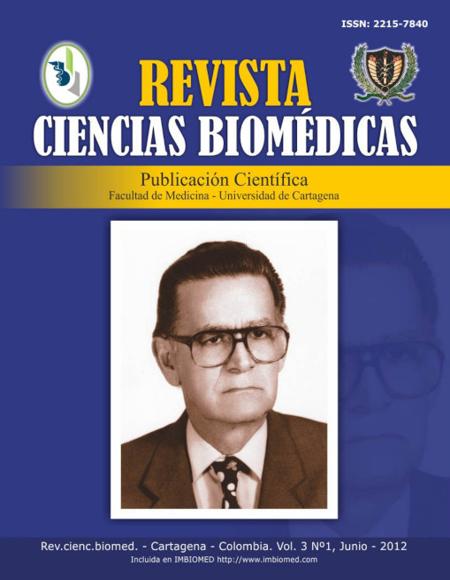Síndrome de peutz-jeghers como causa de invaginación intestinal
Síndrome de peutz-jeghers como causa de invaginación intestinal
Contenido principal del artículo
Resumen
Introducción: el síndrome de Peutz-Jeghers, también conocido como lentiginosis periorificial es una enfermedad de transmisión autosómica dominante. Se caracteriza por la asociación de poliposis gastrointestinal y pigmentación mucocutánea, la cual se evidencia desde los primeros años de vida y puede permanecer hasta la edad adulta.
Los pólipos son de tipo hamartomatoso y se presentan con mayor frecuencia a nivel del intestino delgado aunque existen casos reportados en estomago e intestino grueso.
Caso clínico: joven de 14 años que se le diagnostica síndrome de Peutz Jeghers al consultar al servicio de urgencias del Hospital Infantil Napoleón Franco Pareja, Cartagena, Colombia. Ingresó con dolor abdominal agudo secundario a invaginación intestinal, que requirió corrección quirúrgica y resección intestinal. Diagnóstico tardío, a pesar de presentar lesiones en la mucosa oral y palmo plantares desde etapas tempranas de la infancia. Se reporta este caso para ampliar el conocimiento general sobre esta patología, buscando aumentar la sensibilidad del personal médico para su diagnóstico temprano, evitando así la morbilidad y mortalidad que traen consigo sus complicaciones.
Conclusiones: el síndrome de Peutz-Jeghers ha sido asociado a un incremento en el riesgo de invaginación intestinal como sucedió en el caso presentado. También es asociado a anemia y cáncer. Es importante el diagnóstico temprano del síndrome para la búsqueda de pólipos, identificarlos y resecarlos contribuye a reducir el riesgo de invaginación intestinal. Rev.cienc.biomed. 2012;3(1):136-140
Descargas
Datos de publicación
Perfil evaluadores/as N/D
Declaraciones de autoría
- Sociedad académica
- Universidad de Cartagena
- Editorial
- Universidad de Cartagena
Detalles del artículo
Referencias (VER)
Higham P, Alawi F, Stoopler ET. Medical management update: Peutz-Jeghers Syndrome. Oral Surgery, Oral Medicine, Oral Pathology, Oral Radiology and Endodontology. 2010;109(1):5-11.
Amos CI, Frazier ML, Mcgarrity TJ, Pagon RA, Bird TC, Dolan CR, Stephens K, Peutz-Jeghers Syndrome. Gene Reviews. Seattle (WA): University Of Washington, Seattle. 2001.
Griffith Cd, Bisset W H, Peutz-Jeghers syndrome. Archives disease in childhood. 1990,55,866-869.
Offerhaus G. Johan AH, Peutz R, Giardiell F. Biographical Sketch of jan Peutz. Gastroenterology. 2008;134:1628-1629.
Vasovčák P, Puchmajerová A, Roubalík J. Mutations In STK11 Gene In Czech Peutz-Jeghers Patients. BMC Medical Genetics 2009,10:69-71.
Nakagawa H, Koyama K, Miyoshi Y. Nine novel germline mutations of STK11 in ten families with Peutz-Jeghers syndrome. Hum Genet 1998;103:168-172.
Hinds R, Philp C, Hyer W, Fell JM. Complications of Childhood Peutz-Jeghers Syndrome: Implications for Pediatric Screening. J Pediatr Gastroenterol Nutr. 2004;39(2):219-220.
Tomlinson I, Houlston R. Peutz-Jeghers Syndrome. J Med Genetics. 1997;34:1007–1011.
Hutchison J. Pigmentation of lips and mouth. Arch Surgery. 1896;7:290-291.
Sternberg S, Mills S, Carter D. IN: Sternberg’s Diagnostic Surgical Pathology. Fourth edition. Lippincott, Williams and Wilkins. Phyladelphia. 2004.
Burkart A, Sheridan T, Lewin M, Fenton H. Do Sporadic Peutz-Jeghers polyps exist? Experience of a large teaching hospital. Am J Surg Pathol. 2007;31:1209-1214.
Ospina J, Pío A. Síndrome De Peutz-Jeghers. Presentación de casos y revisión de la literatura. Rev Col Gastroenterol. 2009;24:188-199.
Gammon A, Jasperson K, Kohlmann W. Hamartomatous polyposis syndromes. Best Pract Res Clin Gastroenterol. 2009;23(2):219-231.
Westerman A, Wilson J. Peutz-Jeghers syndrome: risk of a hereditary condition. Scand J Gastroenterol. 1999;230:64-70.
Barker D, Sharma R, McIndoe A, Blair E. An unusual case of sex cord tumor with annular tubules with malignant transformation in a patient with Peutz Jeghers syndrome. International Journal of Gynecological Pathology. 2009,29:27-32.
Song S, Lee J, Saw H. Peutz-Jeghers syndrome with multiple genital tract tumors and breast cancer: a case report with a review of literatures. J Korean Med Sci. 2006;21:752-577.
Postgate A, Hyer W, Phillips R, et al. Feasibility of video capsule endoscopy in the management of children with Peutz-Jeghers syndrome: a blinded comparison with barium enterography for
the detection of small bowel polyps. J Pediatr Gastroenterol Nutr. 2009;49(4):417-423.



 PDF
PDF
 FLIP
FLIP





